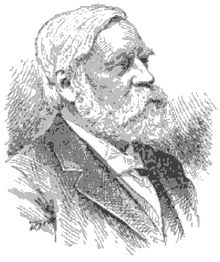Samuel Colgate | |
|---|---|
 | |
| Born | March 22, 1822 |
| Died | April 23, 1897 (aged 75) |
| Burial place | Rosedale Cemetery, New Jersey |
| Nationality | American |
| Occupation(s) | Manufacturer and philanthropist |
| Organizations | |
| Spouse | Elizabeth Ann Morse (1829–1891) |
| Children |
|
| Parents |
|
| Relatives | Robert Lane Colby (brother-in-law) |
| Family |
|
| Signature | |
Samuel Colgate (March 22, 1822 – April 23, 1897), son of William Colgate, was an American manufacturer and philanthropist, born in New York City. When William Colgate died in 1857, Samuel took over the business (he did not want to continue the business but thought it would be the right thing to do), reorganizing it as Colgate & Company. In 1872, Samuel introduced Cashmere Bouquet, the world’s first milled perfumed toilet soap. Then in 1873, Colgate introduced its first Colgate Toothpaste, an aromatic toothpaste sold in jars. In 1896, the company sold its first toothpaste in a collapsible tube (which had recently been invented by dentist Washington Sheffield), named Colgate Ribbon Dental Cream. Also in 1896, Colgate hired Martin Ittner and under his direction founded one of the first applied research labs. The manufactory he built in Jersey City developed into one of the largest establishments of its kind in the world and is now part of Colgate-Palmolive.
He was also prominent in philanthropic work. For more than 30 years he was trustee of Colgate University, and for many years he was president of the New York Baptist Education Society, president of the Society for the Suppression of Vice, and a member of the executive committee of the American Baptist Missionary Union and of the American Tract Society. One of his most noteworthy achievements was the collection of 30,000 volumes of reports (now at the American Baptist Historical Society), comprising the documentary records of the Baptist denomination.[1]
Colgate built a home in Orange, New Jersey, where he died on April 23, 1897, due to heart issues.[2] He is interred in Orange's Rosedale Cemetery.[3]
- ^ "Historical Notes". American Baptist Historical Society. January 25, 2016. Retrieved August 2, 2019.
- ^ "Death Of Samuel Colgate.; The Well-Known Manufacturer and Philanthropist Falls a Victim to Henry Disease.", The New York Times, April 24, 1897. Accessed October 29, 2021. "Orange, N. J., April 23 - Samuel Colgate, head of the firm Samuel Colgate & Co., one of the largest soap and perfume houses in the country, died of heart trouble at his home in this city this afternoon."
- ^ "Rosedale Cemetery Walking Guide of Notable Interments" (PDF). Retrieved November 8, 2022.